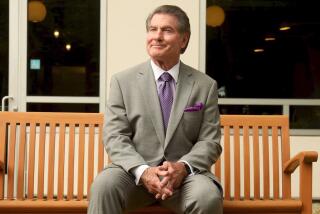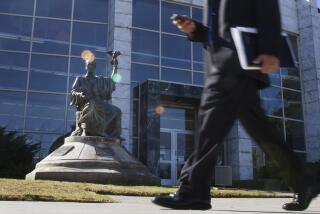Pardon in Hand but Still Proud of His Crime: Aiding Israel
JERUSALEM — Financier Marc Rich lobbied world leaders, hired top-drawer lawyers and apparently shelled out hundreds of thousands of dollars to help secure his pardon from President Clinton.
Convicted spy Jonathan Jay Pollard enlisted the aid of Nobel peace laureate Elie Wiesel and some of Washington’s most influential lobbyists, although he still couldn’t obtain clemency.
And then there is Al Schwimmer, who for decades steadfastly refused to apologize for his crime, and he didn’t ask for a pardon, yet he got one anyway--thanks to a close friend and financial supporter of Clinton who lobbied on his behalf.
Schwimmer, convicted in 1950 of violating the U.S. Neutrality Act for smuggling planes to forces fighting for the establishment of Israel, says he didn’t even know he had been pardoned until American friends called to congratulate him.
“I guess I should be happy,” the 83-year-old U.S.-Israeli citizen, who now lives in semiretirement in Tel Aviv, said Friday. “I’ve lived most of my life without a pardon, so don’t expect me to throw a party now.”
Schwimmer, a former arms dealer, achieved notoriety in the mid-1980s when he and two other arms merchants emerged as brokers in an ill-fated attempt to trade U.S. and Israeli weaponry for American hostages held by pro-Iranian Muslim fundamentalists in Lebanon.
But four decades before that, he used his experience in the U.S. Transport Command to recruit pilots and smuggle planes to what is now Israel. At the same time, a friend--Las Vegas Sun Publisher Hank Greenspun--was smuggling guns and other munitions into the then British-run territory.
The planes and weaponry played a major role in Israel’s 1948 War of Independence. But when Schwimmer, Greenspun and a cohort returned to the U.S. in 1950, they faced federal indictments.
Greenspun pleaded guilty. Schwimmer asked for a trial and was convicted. Both were fined $10,000 and stripped of their rights, which meant they couldn’t vote, run for office or serve in the military reserves.
Greenspun sought and received a pardon from President Kennedy in the 1960s. Schwimmer says he went on with his life. In 1951, he was running a Burbank aircraft maintenance company when Prime Minister David Ben Gurion invited him to start an aircraft industry in Israel. When Schwimmer retired in 1988, the firm he founded, Israel Aircrafts Industries, had become a $1-billion-a-year business.
Schwimmer also kept in touch with Greenspun, who died in 1989, and then with Greenspun’s son Brian, who runs the Las Vegas Sun in addition to his family’s vast real estate empire.
Like his father, the younger Greenspun is a man with influence. A classmate of Clinton at Georgetown University, he was a frequent visitor to the White House. He slept in the Lincoln Bedroom and donated tens of thousands of dollars for Clinton’s election campaigns. He also used his Las Vegas mansion to raise hundreds of thousands more for those campaigns.
Greenspun says that he asked Schwimmer last year whether he wanted him to seek a pardon but that Schwimmer’s answer was not if it involved signing “any piece of paper saying that he did something wrong. Like my father’s, his service to Israel was one of the proudest things he’d ever done.
“I told him I still wanted to run it up the flagpole to see where it goes,” Greenspun said.
Greenspun says he was Clinton’s guest at a private retreat in November at Camp David, Md., where he asked the president to consider pardoning Schwimmer.He says he submitted a formal pardon application after the president told him to put that request in writing.
Greenspun says he is aware of the controversy surrounding Clinton’s clemency for Rich, convicted drug dealer Carlos Vignali and others, but he is not concerned that he could be accused of using his influence to win clemency for Schwimmer.”A case like this is what pardons were made for,” he said. “I have no qualms about what I did.”
Schwimmer, meanwhile, says he is still awaiting some official notice informing him that his rights have been restored.
“Hmm, maybe I’ll vote [in U.S. elections] now,” he said.
Then, with a chuckle, the millionaire said: “I’ve always told my friends that the only difference losing my rights made was that I wouldn’t be able to get a job as a mailman in the United States.”
More to Read
Sign up for Essential California
The most important California stories and recommendations in your inbox every morning.
You may occasionally receive promotional content from the Los Angeles Times.









